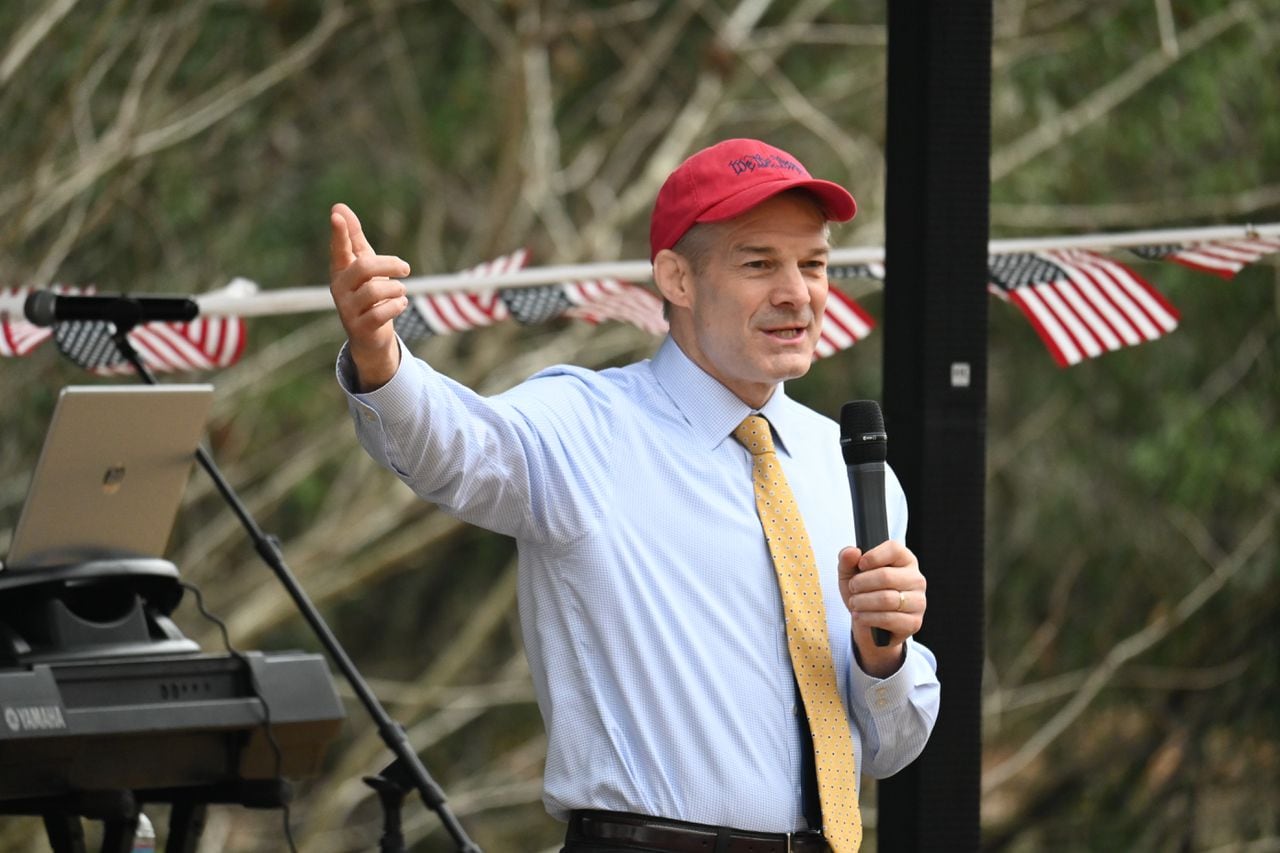Ohio Rep. Jim Jordan campaigns for Rep. Barry Moore in Alabama
U.S. House Judiciary Chairman Jim Jordan encouraged a crowd of conservative voters Saturday outside a rural wedding venue in Robertsdale to vote for U.S. Rep. Barry Moore on March 5, because “he cares about the things you care about.”
Jordan’s push for Moore’s candidacy came during the end of a speech highlighted with stories about his personal conversations with former President Donald Trump, and the concerns he has about liberal politicians “coming after our fundamental liberties.”
Jordan, an Ohio Republican and a founder of the right-wing House Freedom Caucus, said Moore has the same fighter attributes as Trump, and “an American attitude” also shared by Moore.
“You know what he’s like, and that’s why you are out here supporting him,” Jordan said about Moore, a member of the House Freedom Caucus who was first elected to Congress in 2020. “He’s that kind of guy.”
Jordan also spent Saturday campaigning for U.S. Rep. Gary Palmer, R-Hoover, the other Alabama lawmaker who is a member of the Freedom Caucus. Palmer is opposed by Gerrrick Wilkins, who was recently endorsed by former National Security Advisor Lt. Gen. Michael Flynn.
In Robertsdale, the campaign rally was aimed at boosting Moore’s appeal ahead of a GOP primary contest against fellow Republican U.S. Rep. Jerry Carl of Mobile. The two are battling out in a rare contest of incumbents for a congressional seat in Alabama.
“Barry Moore is a dear friend, a good man and you know that,” Jordan said. “In 5-1/2 weeks, make sure he’s the next guy staying in Washington and fighting for the things we fight for.”
Neither Moore nor Jordan mentioned Carl during their remarks, though Moore said afterward that he believes he is the preferred choice among conservative voters within a district that was redrawn into an even more Republican-leaning district than it was before a federal court intervened in Alabama’s congressional redistricting.
Baldwin and Mobile counties have the district’s largest population bases, but much of the City of Mobile is now in the 2nd congressional district, leaving right-leaning Baldwin County as the dominant population base. The two counties are joined with seven rural and heavily conservative counties to its east extending into the Wiregrass. Dothan, in Houston County, is the district’s largest city with a population slightly more than 71,000 residents.
“(The) district went from 75th most conservative to the 6th most,” Moore said, referring to a Cook Political Report analysis of the district after the court-ordered redrawing of Alabama’s congressional map that led to the 2nd district becoming more left-leaning to give Black voters a chancel to select a candidate of their choice.
Moore is the current 2nd district congressman whose home in Enterprise was redrawn into the 1st district.
“I can run on a (conservative) record and because I’m the only House Freedom Caucus member in this race who is fighting to save the nation rather than bring home the bacon,” Moore said. “The swamp doesn’t want me back and they don’t want Trump back.”
The Carl campaign declined to comment about the rally.
The rally was also the first since a debate on Wednesday in which Moore and Carl showed some differences in philosophy over a few issues, namely on their views about spending on national defense. Moore voted against the National Defense Authorization Act, saying he is concerned over ballooning federal deficits, unchecked spending on Ukraine, and concern over the four-month extension of the Foreign Intelligence Surveillance Act (FISA).
Moore told the media there were several things added into the $886.3 billion NDAA he felt were a “poison pill” and were a reason why he was a “No” vote. Moore was the only Alabama member of Congress to vote against the defense spending bill that was passed out of the House with a 310-118 vote.
Carl, during the debate, blasted Moore for the “No” vote, saying that not supporting a national defense bill was about as “unAmerican as you can get.” He said the NDAA included a 5.2% pay raise for members of the military, and touted the defense bill for including funding to support new ships built at Mobile’s Austal USA plant, and $40 million toward Fort Novosel, formerly Fort Rucker.
The Freedom Caucus, in the days before the NDAA vote, came out in opposition largely over the FISA authorization.
First enacted in 2008, Section 702 of FISA legalized a form of warrantless surveillance first authorized by the Bush administration after the terrorist attacks on Sept. 11, 2001. Congress has acted several times to extend Section 702, but the law was set to expire last month. The NDAA vote leaves it intact until April.
Some Republicans oppose the program, distrustful of the FBI and its investigation into Trump’s 2016 campaign ties with Russia.
“If you left all nine of the good things (the House Freedom Caucus pushed for) instead of stripping eight of them out, and still said we’ll authorize the FBI’s spying on Trump and American citizens during an election year, I would have been a ‘No’ vote,” Moore said. ” Those soldiers called my office and said ‘we appreciate you standing and holding the line’ and ‘we are fighting for the nation and don’t mind we didn’t get a 5% raise. The fact you said the FBI cannot spy on U.S. citizens, that’s more important.’ Liberty is ultimately the thing.”
